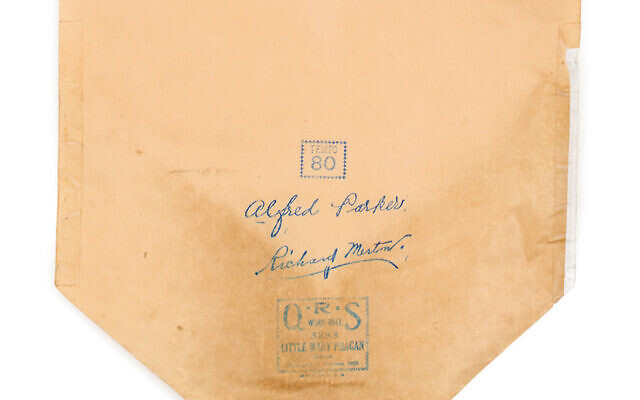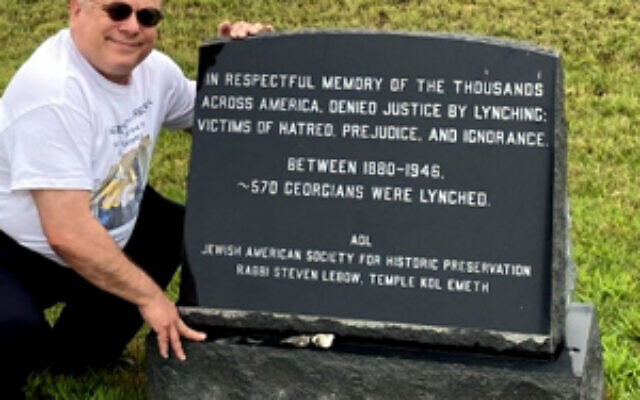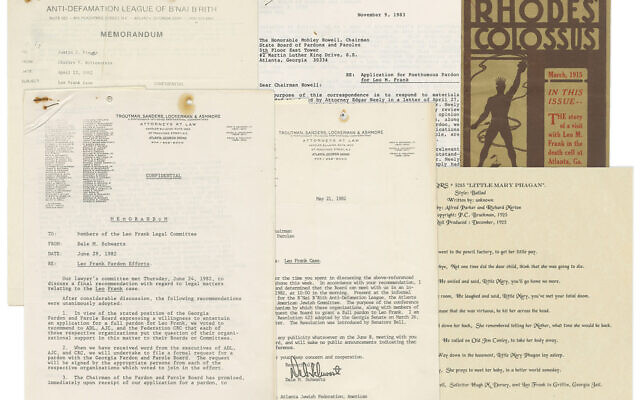Leo Frank Memorabilia Auctioned in Jerusalem
The online auction, which began May 24 at the Kedem Auction House in Jerusalem, is anticipated to bring in some $8,000 to $12,000.
Dave Schechter is a veteran journalist whose career includes writing and producing reports from Israel and elsewhere in the Middle East.

An auction house in Israel is seeking a minimum bid of $5,000 for a collection of two dozen items related to the lynching of Leo Frank.
The online auction, which began May 24 at the Kedem Auction House in Jerusalem, is anticipated to bring in some $8,000 to $12,000.
Atlantans familiar with memorabilia connected to the Frank case said that, while not remarkable individually, the sale is evidence of continued interest in the only known lynching of a Jew in the United States.
The items for sale include a postcard with a photograph of Frank’s body hanging from a tree after he was lynched on Aug. 17, 1915, in what then was a woods in Marietta, near Freys Gin Road. Numerous copies of the Frank lynching photograph have sold over the years. In 2012, one went for $3,125 at an auction by Sotheby’s. And in 2009, Kedem sold one at auction for $813.
The auction house is also selling a player piano roll featuring “The Ballad of Mary Phagan,” a song about the 13-year-old girl whom Frank was convicted of killing on April 26, 1913, in the downtown Atlanta pencil factory where he was a manager. The lyrics to the 1925 song are printed in the margins.
The lot includes letters and legal memoranda from the 1980s that discuss efforts by the ADL to exonerate Frank. Some were written by the late attorney Dale Schwartz, who died in August 2021 and whose legacy included years of efforts to clear Frank’s name.

Frank was convicted on Aug. 28, 1913, and sentenced to death. After Gov. John Slaton commuted his sentence to life in prison, a cabal of Cobb County men, calling themselves “The Knights of Mary Phagan,” kidnapped the 31-year-old Frank from the state prison in Milledgeville. The Jewish factory manager, who had migrated south from New York to work, was hung from a tree.
In 1983, the Georgia State Board of Pardons and Paroles rejected a pardon application filed after 85-year-old Alonzo Mann told The Tennessean newspaper what he had witnessed while working at the factory on the day Phagan was murdered. The state board determined that “it is impossible to decide conclusively the guilt or innocence of Frank.”
Three years later, Schwartz and his colleagues made, in his words, “not a legal argument so much as a political or emotional plea.” In granting that application, the board said it acted “without attempting to address the question of guilt or innocence and in recognition of the state’s failure to protect the person of Leo M. Frank and thereby preserve his opportunity for continued legal appeal of his conviction, and in recognition of the state’s failure to bring his killers to justice.”
A memorial to Leo Frank was dedicated September 2018 on a grassy strip on Roswell Road in Marietta, just south of Interstate 75. A memorial to lynching victims was erected nearby in December 2018. Between 1880 and 1946, more than 3,400 Black Americans were lynched, including an estimated 570 in Georgia alone.

One of the people instrumental in finding a site for the Leo Frank memorial and ongoing efforts to fully clear Frank’s name is Rabbi Steve Lebow, now rabbi emeritus of Temple Kol Emeth in Marietta. “The lynching of Leo Frank and the murder of Mary Phagan was, at one time, the greatest unsolved mystery of Georgia history. Because of its notoriety there will always be an interest in memorabilia of that awful crime.
That said, the items which are currently for sale do not stand out as remarkable in the study of the Frank case,” Lebow said. “There are hundreds of post cards, and copies of cards, that display the lynching of Frank. The player piano version of ‘Little Mary Phagan’ is an oddity, but does not necessarily represent a ‘valuable collectible.’ The copies of letters of support for Leo Frank are just that — copies.”
“That said, that these items are for sale indicates that the lynching remains of continued interest,” Lebow added.

Sandy Berman, who was an archivist at the William Breman Jewish Heritage Museum for 28 years and now consults for the museum, concurred. “Nothing on that list is something that is unique or something that we, the Breman, doesn’t have. We probably have eight, 10 different views of the lynching,” some postcards and other original prints, she said.
Berman added that what would be significant, should the items ever turn up, are film footage believed to have been shot of Frank at the state prison in Milledgeville, the autopsy reports on Mary Phagan and the actual transcript of Frank’s trial, as opposed to the more condensed brief of evidence.
- News
- Local
- Dave Schechter
- Auction
- Israel
- Leo Frank lynching
- Memorial
- Kedem Auction House
- marietta
- Freys Gin Road
- Sotheby’s
- The Ballad of Mary Phagan
- player piano
- ADL
- Anti-Defamation League
- Dale Schwartz
- The Knights of Mary Phagan
- Georgia State Board of Pardons and Paroles
- Alonzo Mann
- The Tennessean
- Rabbi Steve Lebow
- Temple Kol Emeth
- William Breman Jewish Heritage Museum
- sandy berman



comments